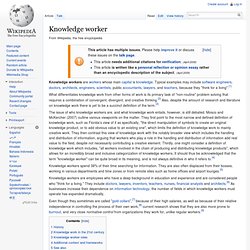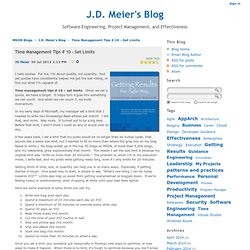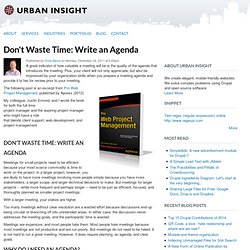

Simon Sinek: How great leaders inspire action. Start With Why. Knowledge worker. What differentiates knowledge work from other forms of work is its primary task of "non-routine" problem solving that requires a combination of convergent, divergent, and creative thinking.[2] Also, despite the amount of research and literature on knowledge work there is yet to be a succinct definition of the term.[3] The issue of who knowledge workers are, and what knowledge work entails, however, is still debated.

Mosco and McKercher (2007) outline various viewpoints on the matter. They first point to the most narrow and defined definition of knowledge work, such as Florida’s view of it as specifically, "the direct manipulation of symbols to create an original knowledge product, or to add obvious value to an existing one", which limits the definition of knowledge work to mainly creative work. Knowledge workers spend 38% of their time searching for information. History[edit] Savage (1995) describes a knowledge-focus as the third wave of human socio-economic development.
See also[edit] Time Management Tips # 10 - Set Limits - J.D. Meier's Blog. I hate quotas.

For me, I'm about quality, not quantity. And yet quotas have consistently helped me get the ball rolling, or find out what I'm capable of. Time management tips # 10 – set limits. When we set a quota, we have a target. It helps turn a goal into something we can count. In my early days of Microsoft, my manager set a limit that I needed to write two Knowledge Base articles per month. A few years back, I set a limit that my posts would be no longer than six inches (yeah, that sounds like a weird size limit, but I wanted to fill no more than where the gray box on my blog faded to white.) Setting limits in time, size, or quantity can help you in so many ways. Here are some example of some limits you can try: Write one blog post each day. Mind Tools - Management Training, Leadership Training and Career Training.
Quit procrastinating, already. How to stop - TODAY Health. Each year Americans waste millions of dollars by not filing their taxes on time.

Workers forego hundreds of thousands of dollars in matching 401K contributions because they never got around to signing up for their retirement program. And we all know what happens when we put off starting that diet plan. One study found procrastination makes us poorer, fatter and unhealthier. “Everybody procrastinates, but not everyone is a procrastinator,” says Joseph Ferrari, professor of psychology at DePaul University and author of “Still Procrastinating? The No-Regrets Guide to Getting It Done.” It’s not a time-management issue. Scientists insist there aren’t any benefits of procrastinating for any of us. Here’s why you keep putting things off and how to quit procrastinating: Procrastination mantra: All-or-nothing thinking.
Flextime. 33 Rules to Boost Your Productivity. Heuristics are rules intended to help you solve problems.

When a problem is large or complex, and the optimal solution is unclear, applying a heuristic allows you to begin making progress towards a solution even though you can’t visualize the entire path from your starting point. Suppose your goal is to climb to the peak of a mountain, but there’s no trail to follow. An example of a heuristic would be: Head directly towards the peak until you reach an obstacle you can’t cross. Whenever you reach such an obstacle, follow it around to the right until you’re able to head towards the peak once again.
This isn’t the most intelligent or comprehensive heuristic, but in many cases it will work just fine, and you’ll eventually reach the peak. Heuristics don’t guarantee you’ll find the optimal solution, nor do they generally guarantee a solution at all. Heuristics have many practical applications, and one of my favorite areas of application is personal productivity. 101 Excellent Resources And Tools For Students Of Any Age. Whether you’re a student just starting the school year or you’re a lifelong learner like me, you’ll find resources, tools and a ton of fun stuff to stash in your virtual backpack. If you find these resources helpful, please share this post with your friends. I would greatly appreciate it. Before you begin, make sure you Grab Your Free Brain Training Power Pack. Increase Your IQ Score Day by day account of our experiment to increase IQ.
See how well it worked… Brain Pages Find help and support on just about any topic relating to brain fitness. Don't Waste Time: Write an Agenda. A great indicator of how valuable a meeting will be is the quality of the agenda that introduces the meeting.

Plus, your client will not only appreciate, but also be impressed by your organization skills when you prepare a meeting agenda and provide it to her for review prior to your meeting. The following post is an excerpt from Pro Web Project Management, published by Apress (2012). My colleague, Justin Emond, and I wrote the book for both the full-time project manager and the aspiring project manager who might have a role that blends client support, web development, and project management.
Don't Waste Time: Write an Agenda Meetings for small projects need to be efficient because your most scarce commodity is time to work on the project. With a larger meeting, your stakes are higher. Too many meetings without clear resolution are a wasted effort because discussions end up being circular or branching off into unintended areas.
Meetings are expensive, and most people hate them.